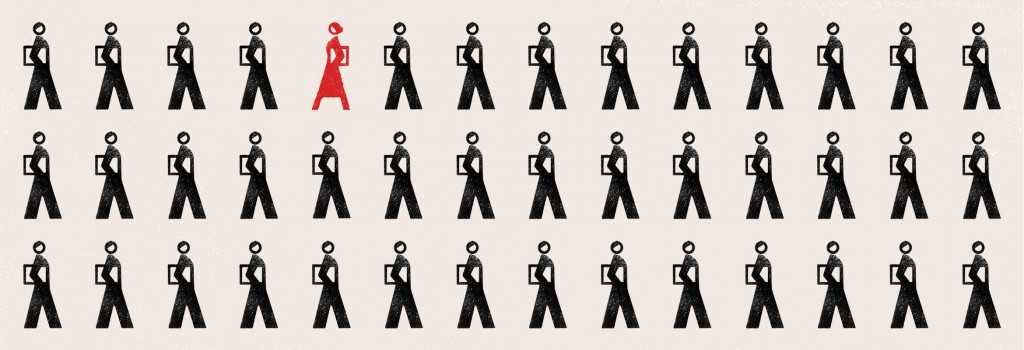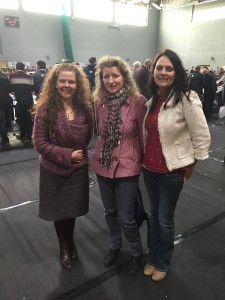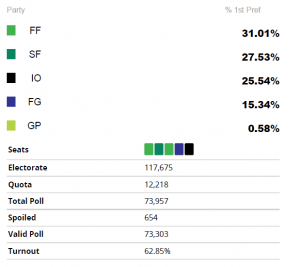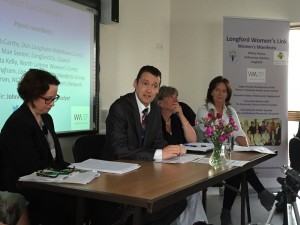 A rural analysis of the 2016 general election results from 5050 North West member Danielle Bonner in Donegal.
A rural analysis of the 2016 general election results from 5050 North West member Danielle Bonner in Donegal.
So the 2016 general election has concluded and we’ve seen a historical rise in the number of women elected to the Dáil, now 22% up from 16%. Although this rise is a far cry from equal representation it is a right step forward and an advancement Ireland should be proud of. But can Donegal be proud too?

Paula Flanagan (Green Party), Cordelia Nic Fhearraigh (Fís Nua) and Niamh Kennedy (Independent).
In February I was invited by candidate Paula Flanagan to observe the election count, an experience which highlighted how male dominated politics is in Donegal. Two women Mary Coughlan and Cecilia Keaveney have only ever been elected to represent Donegal in Dáil Éireann. This year sixteen candidates contested the election of which three were women; Paula Flanagan (Green Party), Cordelia Nic Fhearraigh (Fís Nua) and Niamh Kennedy (Independent).
Arguably the county’s voting history was against these women but having followed some of their campaigns it was evident they had passion and dedication while their skills and experience were also strong. Niamh being a sitting County Councillor and Paula and Cordelida having considerable community development experience. There question was could voters see the merit in these candidates?
As the final voting figures have revealed sadly not, worse still the women received just 3.18% of 1st preference votes in Donegal. With such low votes the question arises why does Donegal not support women? We could easily say that’s just how democracy works or people shouldn’t vote for a candidate just because they’re a woman. But these answers don’t get us closer to addressing the real problem that women are seriously underrepresented in Donegal politics.

Donegal Voting
On closer review there’re a range of reasons why women did not gain voter support on the same level men do, one being there’s was no diverse choice, 3 women out of 16 candidates equates to just 18% choice. While voters loyal to the big political parties Fianna Fáil, Fine Gael & Sinn Féin who collectively received over 73% of 1st preference votes, had no choice but to vote for a male candidate because not one of the parties put a women forward.
Donegal has no shortage of talented capable women, so why did so few run or were identified by the parties to stand? For the three parties the situation in Donegal really raises a question over their commitment to reduce gender inequality and support women especially in rural Ireland. And they need to ask some challenging question to actually address this situation, like do they need to reform the way their candidates are nominated? Should more men in the party be stepping up and actively supporting women in their parties build political careers, even if it means putting theirs on hold? While should women themselves be taking more risks and challenge their political party status quo?
I chatted with Paula Flanagan about the importance of supporting women and the structures which can pose barriers them. For example women still carry out the majority of childcare responsibilities and she highlighted the challenging practicality for a mother running back between Donegal and Dublin stating that it’s not feasible and not family friendly. However simple things like changing working hours or holding video conferences could reduce such a barrier.
But why does equal representation matter in politics? Well apart from being a basic social justice, how can any policy or decision making process be equal or even sustainable when half the population has no input into the structures which makes the decisions. If we’re a society that wants to advance and develop sustainably we therefore need to have men and women equally at the decision-making table.
As a community we also need to support women, by encouraging them to engage and not undervalue what they offer to politics. I’ve heard a lot of women say they’re either not interested or don’t understand politics. Politics impacts all our lives whether we realise it or not so we have a vested interested to engage and follow what’s going on, as a community we should promote this. While women need to recognise the diverse knowledge and life experiences they have to offer which goes towards supporting and creating a more equal society for both men and women.
During the count I’d asked candidate Paula Flanagan what she had learnt by standing for election, she said “You never know what you’re capable of until you do it”, her words serve as inspiration for other women because until more women get out and try politics they won’t see what they are capable of and the great skills they have to offer it.

